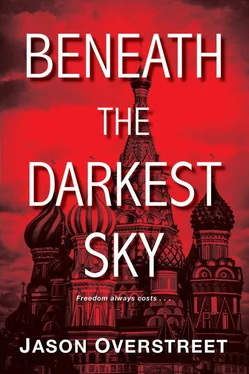“Yeah, Prescott,” said Homer. “These trials are disturbing. I’ve attended many at the House of the Unions myself.”
“Did you see any niggas on trial?” I sarcastically said, taking a drink of wine.
Homer looked at me crossways.
“I think it’s more complicated than we realize,” I said. “Yes, people are being arrested, but just as Premier Molotov once told me, people get arrested in New York City, too. There’s a battle for the soul of the Soviet Union going on here, the old hands versus the new.”
“Two years ago,” said Homer, sipping his wine, “you sounded like this man I knew named Prescott Sweet. Now you sound like your wife.”
“Well,” I said, “she’s a lot smarter than me, and this country has done nothing but treat my colored wife like a queen, my colored children as human beings, and my colored behind as something more than a nigger, so I guess I’m guilty of being blind, naïve, foolish, ignorant, and maybe even unsympathetic to men and women who are being arrested for committing crimes against a State that knows far more than I about people’s loyalties.”
“Looks like you’ve done found a certain mood,” said Wayland, crossing his legs.
“I’m tired of not being selfish,” I said. “The white man built our country, America, off of being nothing but just that— selfish . At least here I can have the audacity to be selfish and not get lynched for it. And to your point, Robert, do you ever stop to ask yourself why your black ass is still making tools and going home at night to a warm bed? And make no mistake, when you pull back the curtain in your bedroom, you won’t see any burning crosses or white men in sheets on horses yelling, ‘You uppity coon! How dare you order other toolmakers around and talk to our white women at the bars! How dare you act smart! You ain’t no educated engineer! You’re an abomination! Go back to Africa!’”
“Hell,” said Homer, raising his eyebrows, “the only thing you have left to say, Prescott, is, ‘Can a brutha get an amen?’ ”
The four of us laughed hesitantly, breaking a bit of the tension.
“Thank you, Homer,” I said, looking at my watch, realizing the children had now been asleep for two hours. “Did all of that jive with you, Robert?”
“Yes, I guess. But I don’t go to bars.”
Homer, Wayland, and I looked at him and wanted to laugh. Robert was ever the engineer, only taking in the facts and calculating them accordingly. I loved him.
“Where did you find this nice furniture, Prescott?” said Wayland, looking around. “It certainly doesn’t look like anything sold off by some wealthy Russian of yesteryear.”
“No,” I said, looking at our empty plates, the fried chicken, mashed potatoes, and carrots I’d cooked completely devoured. “My friend Dorene Ellington has a particular passion for interior design. She considered it her pet project to furnish this place. All of it was shipped in from London and Paris. The Ellingtons are in Argentina now, but when they were living in Moscow, they spent at least two days a week here, so she certainly got to enjoy it.”
“It’s very bourgeois,” said Robert, “which is wonderful, as far as I’m concerned, delightful to look at, but I wonder how the blue tops would interpret it, that’s all.”
“You’ve told me this before, Robert,” I said. “The last time you were here.”
“Please!” said Homer. “It’s much plainer in taste than that czarist shit I see in all the supposed proletariat homes of most State officials. All that gold and maroon! This décor here is nothing but dark wood chairs and floors, brown and cream upholstery, and pristine white walls. Makes for a very clean, crisp look, I must say, quite foreign to Moscow. And shoot! Your wife’s framed paintings hanging everywhere provide just the right amount of color to accentuate it all. NKVD would consider it a Socialist Realism paradise.”
“This color scheme is what my wife likes, Wayland,” I said, sipping my red wine. “Our home on Strivers’ Row in Harlem had a similar décor. Dorene also happens to like the chocolate against white, so she and my wife had a ball picking items out. Dorene and Bobby sure are missed. And our children were so close to theirs.”
“Speaking of missed,” said Robert. “I went by to see B the other day and she acted like I was with NKVD. When I asked about Lovett and when she’d last seen him, the look on her face went cold. She said she hadn’t heard from him at all. She said my guess was as good as hers.”
“You know,” said Homer, “I went by there recently and she said the same thing to me. It’s concerning. Sounds like Lovett done found him a new wife down in Kuybyshev!”
“You act surprised,” said Wayland. “Y’all know Lovett wasn’t ever one to sit still. Shoot, he probably finally got the State to let him leave for Cuba or Canada, places he’s been before. Probably found him a Cuban wife. Or, for that matter, he’s probably back in Dallas or New York City signing up new Party members. And hell, if there’s one thing I’ve learned about Lovett, he’s the last brother in the world any of us needs to worry about.”
Magadan, Russia
October 1938
IT HAD TAKEN TWO MONTHS FOR KOSKINEN’S LETTER ABOUT MY POTENTIAL spy mission to be met with a response. And it had come in the form of a cable from Moscow. Koskinen hadn’t sent the original letter as a telegram because of its sensitivity, which made sense. What he probably hadn’t expected was to be completely left out of the loop when the Kremlin responded.
I was approached by a guard on a Wednesday morning while standing in the soup line with Lovett and James. He simply told me to come with him and I was led to a black vehicle, then driven down toward the shipping docks. Before we actually reached them, however, we turned left, well on this western side of the rocky cliffs. Navigating a narrow, tree-lined road, we stopped in front of a small, red-painted, stone building and exited. The inside of the building consisted only of a ten-by-ten room, which was dimly lit and had a large, square table in the middle. At the far end sat three important-looking men, all of them dressed in sharp, army green, military-style uniforms and hats.
“Come!” said the guard, leading me to a chair directly across from them, my back to the door. “Sit, zek !” the guard continued, and as I did, he stayed standing beside me.
“Ostav’ nas!” said the serious man sitting in the middle.
“Yes, Director Pavlov,” said the guard, doing as he’d been ordered and exiting, leaving the four of us alone now.
“Mne skazali, chto vy govorite Rossii,” said this man named Director Pavlov to me.
“Yes, that is correct,” I said in Russian, noticing how much thicker he was built than the other two. “I do speak Russian.”
“Well, then you will understand when I tell you that my name is Karp Aleksandrovich Pavlov,” he said, the other two staying quiet, all three sitting tall. “I am the director of the Dalstroi. It is not every day that I am asked by the Kremlin to handle such matters as this. The cables I received were very specific. I have received five alone in the past two days. A lot. Yes?”
“Yes,” I said.
“This entire situation is unique and complicated. But I’m sure you can help us sort it out.”
“I can,” I said.
“I have a fairly decent understanding of what you have proposed. But I have a few questions. Where does this Comrade Ellington believe you to be living right now? Does he know that you were arrested?”
Before answering, I thought of Koskinen. Knowing he had helped me send the few letters to Bobby that I’d sent, and being solely responsible for suggesting that I tell Bobby that I was currently living in Leningrad, I had to think fast. I was sure they hadn’t a clue of Koskinen’s handiwork, and perhaps if they found out, he’d be in big trouble.
Читать дальше











